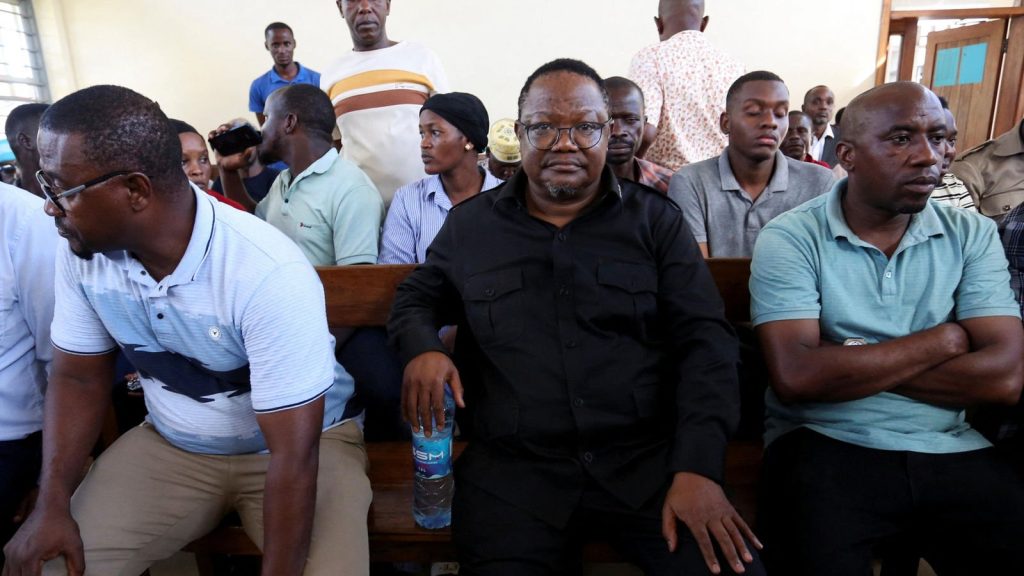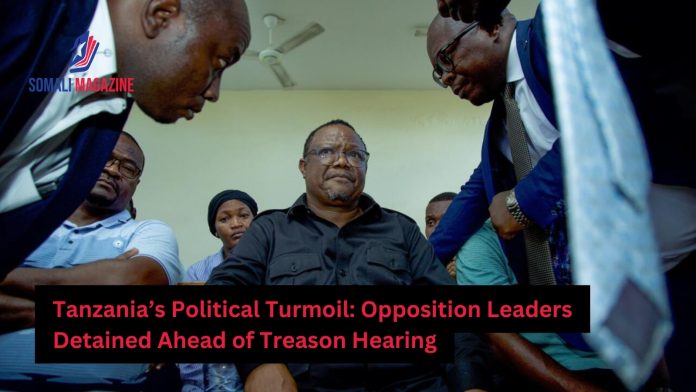Facebook Twitter (X) Instagram Somali Magazine - People's Magazine
Tanzania police have detained two senior opposition leaders from the Chama cha Demokrasia na Maendeleo (CHADEMA) party as they traveled to attend a court hearing for their party leader, Tundu Lissu, who faces treason charges. The arrests, which occurred on April 24, 2025, in Dar es Salaam, have sparked outrage among opposition supporters and raised concerns about the government’s commitment to human rights and political freedoms.
John Heche, CHADEMA’s Deputy Chairperson, and John Mnyika, the party’s Secretary-General, were intercepted by police en route to the Kisutu Magistrate Court, where Lissu was scheduled to appear. The reason for their detention remains unclear, with authorities yet to provide an official explanation. CHADEMA spokesperson Brenda Rupia condemned the arrests, describing them as a blatant violation of civic freedoms. “We are witnessing grave violations of human rights and the rule of law in our country,” Rupia stated.
Lissu, a prominent opposition figure and runner-up in Tanzania’s 2020 presidential election, was charged with treason earlier this month over a speech in which he allegedly called for public rebellion and disruption of the upcoming October elections. Prosecutors claim that Lissu’s remarks constitute an attempt to undermine the electoral process, a charge that carries the possibility of a death sentence under Tanzanian law. Lissu has also been accused of publishing false information, a separate charge to which he pleaded not guilty.
The treason case has placed President Samia Suluhu Hassan’s administration under intense scrutiny, with critics accusing the government of reverting to repressive tactics reminiscent of her predecessor, John Magufuli. CHADEMA has been at the forefront of challenging the government’s policies, refusing to sign an electoral code of conduct that it claims is biased in favor of the ruling Chama cha Mapinduzi (CCM) party. The party’s refusal led to its disqualification from the upcoming elections, further fueling tensions between the opposition and the government.

The arrests of Heche and Mnyika have sparked protests among CHADEMA supporters, who view the detentions as an attempt to silence dissent and intimidate opposition leaders. Demonstrations have been reported in several regions, with protesters demanding the release of the detained leaders and calling for electoral reforms. Security forces have been deployed to maintain order, and authorities have warned against unauthorized gatherings.
Human rights organizations have expressed concern over the escalating crackdown on opposition figures, urging the Tanzanian government to uphold democratic principles and ensure fair treatment for all political actors. Amnesty International has called for the unconditional release of Lissu and other detained leaders, emphasizing the importance of transparency and accountability in the judicial process.

The arrests come at a critical time for Tanzania, as the nation prepares for presidential and parliamentary elections amid growing political tensions. Analysts warn that the exclusion of CHADEMA from the electoral process could undermine the legitimacy of the elections and erode public confidence in the country’s democratic institutions.
As the situation unfolds, the focus remains on whether the government will address the concerns raised by opposition parties and international observers. The detentions of Heche and Mnyika, along with the treason charges against Lissu, serve as a stark reminder of the challenges facing Tanzania’s political landscape and the urgent need for dialogue and reforms to ensure a level playing field for all stakeholders.

